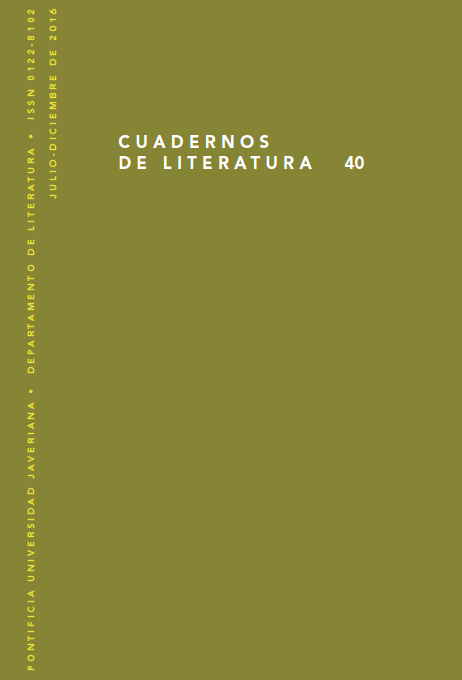Resumen
Este ensayo toma dos obras – Fundido a blanco, de Oscar Muñoz y La experiencia dramática, de Sergio Chejfec– como un laboratorio para reflexionar sobre las transformaciones que sufre la categoría de ficción en el arte y la literatura contemporáneos. Basándome en ciertas formulaciones teóricas de Joan Fontcuberta, Jacques Rancière, Georges Didi-Huberman y del propio Sergio Chejfec sobre la relación entre la ficción y el documento, sugiero que en las obras de Muñoz y de Chejfec se despliega un modo singular de construcción ficcional subjetiva diferente al de la ficción clásica –basada en una lógica representativa– que puede ser entendido como simulación o como síntoma, y que se vincula con una lógica propia de lo digital. Si bien en estas obras se reflexiona sobre el ejercicio autobiográfico, en ellas se propone que la imagen y la palabra se despeguen de una temporalidad biográfica y cronológica para dar lugar a un recuerdo que sobrevive como un resto material, sensorial y afectivo. De este modo, se cancela la posibilidad de leer o mirar las obras en sus aspectos puramente testimoniales; o más bien se devela la trampa ficcional que allí se esconde. La urdimbre de la ficción, entonces, ya no se basa en una verosimilitud sino en la invención de un indicio o en la simulación de un documento.
El material gráfico analizado o directamente referido en el artículo, debe ser de alta calidad, presentarse en hojas individuales, en orden secuencial, y con una resolución mínima de 300 dpi en formatos JPG o TIFF. Los cuadros, diagramas, fotografías y gráficas deben estar acompañados de sus respectivos pies de foto, indicando la fuente de la que fueron tomadas, el título y su ubicación dentro del texto. Es responsabilidad del autor obtener el derecho de autor y permiso para reproducir las imágenes que desea utilizar en sus artículos. Este permiso debe ser para su reproducción impresa y online. Cuadernos de Literatura no reproduce cualquier imagen sin su respectiva autorización.
La revista Cuadernos de Literatura se encuentra registrada bajo la licencia Creative Commons Reconocimiento 4.0 Internacional. Por lo tanto, esta obra se puede reproducir, distribuir y comunicar públicamente en formato digital, siempre que se reconozca el nombre de los autores y a la Pontificia Universidad Javeriana. Se permite citar, adaptar, transformar, autoarchivar, republicar y crear a partir del material, para cualquier finalidad (incluso comercial), siempre que se reconozca adecuadamente la autoría, se proporcione un enlace a la obra original y se indique si se han realizado cambios. La Pontificia Universidad Javeriana no retiene los derechos sobre las obras publicadas y los contenidos son responsabilidad exclusiva de los autores, quienes conservan sus derechos morales, intelectuales, de privacidad y publicidad.
El aval sobre la intervención de la obra (revisión, corrección de estilo, traducción, diagramación) y su posterior divulgación se otorga mediante una licencia de uso y no a través de una cesión de derechos, lo que representa que la revista y la Pontificia Universidad Javeriana se eximen de cualquier responsabilidad que se pueda derivar de una mala práctica ética por parte de los autores. En consecuencia de la protección brindada por la licencia de uso, la revista no se encuentra en la obligación de publicar retractaciones o modificar la información ya publicada, a no ser que la errata surja del proceso de gestión editorial. La publicación de contenidos en esta revista no representa regalías para los contribuyentes.
El retiro de un artículo se solicitará por escrito con un documento impreso al Comité Editorial y se formaliza con la respuesta oficial del Comité.


